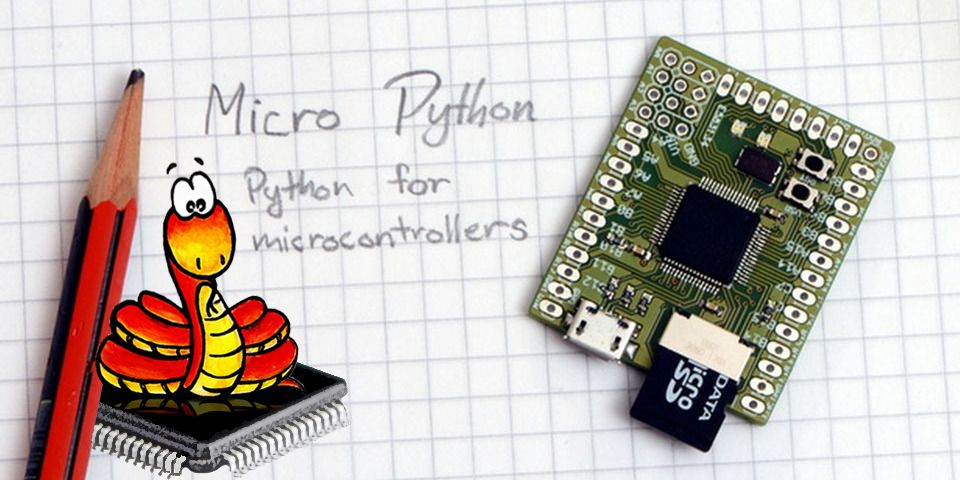Also improve pybsd, and make it save it's pin configuration. This is a necessary step towards supporting the CC3200 low power deep sleep (LPDS) mode. |
||
|---|---|---|
| bare-arm | ||
| cc3200 | ||
| docs | ||
| drivers | ||
| esp8266 | ||
| examples | ||
| extmod | ||
| lib | ||
| logo | ||
| minimal | ||
| py | ||
| qemu-arm | ||
| stmhal | ||
| teensy | ||
| tests | ||
| tools | ||
| unix | ||
| unix-cpy | ||
| windows | ||
| .gitignore | ||
| .travis.yml | ||
| CODECONVENTIONS.md | ||
| LICENSE | ||
| README.md | ||
README.md
[![Build Status][travis-img]][travis-repo] [travis-img]: https://travis-ci.org/micropython/micropython.png?branch=master [travis-repo]: https://travis-ci.org/micropython/micropython
The Micro Python project

This is the Micro Python project, which aims to put an implementation of Python 3.x on microcontrollers and small embedded systems.
WARNING: this project is in beta stage and is subject to changes of the code-base, including project-wide name changes and API changes.
Micro Python implements the entire Python 3.4 syntax (including exceptions, "with", "yield from", etc.). The following core datatypes are provided: str (including basic Unicode support), bytes, bytearray, tuple, list, dict, set, frozenset, array.array, collections.namedtuple, classes and instances. Builtin modules include sys, time, and struct. Note that only subset of Python 3.4 functionality implemented for the data types and modules.
See the repository www.github.com/micropython/pyboard for the Micro Python board, the officially supported reference electronic circuit board.
Major components in this repository:
- py/ -- the core Python implementation, including compiler and runtime.
- unix/ -- a version of Micro Python that runs on Unix.
- stmhal/ -- a version of Micro Python that runs on the Micro Python board with an STM32F405RG (using ST's Cube HAL drivers).
- teensy/ -- a version of Micro Python that runs on the Teensy 3.1 (preliminary but functional).
Additional components:
- bare-arm/ -- a bare minimum version of Micro Python for ARM MCUs. Start with this if you want to port Micro Python to another microcontroller.
- unix-cpy/ -- a version of Micro Python that outputs bytecode (for testing).
- tests/ -- test framework and test scripts.
- tools/ -- various tools, including the pyboard.py module.
- examples/ -- a few example Python scripts.
"make" is used to build the components, or "gmake" on BSD-based systems. You will also need bash and Python (at least 2.7 or 3.3).
The Unix version
The "unix" port requires a standard Unix environment with gcc and GNU make. x86 and x64 architectures are supported (i.e. x86 32- and 64-bit), as well as ARM and MIPS. Making full-featured port to another architecture requires writing some assembly code for the exception handling and garbage collection. Alternatively, fallback implementation based on setjmp/longjmp can be used.
To build:
$ cd unix
$ make
Then to give it a try:
$ ./micropython
>>> list(5 * x + y for x in range(10) for y in [4, 2, 1])
Run complete testsuite:
$ make test
Debian/Ubuntu/Mint derivative Linux distros will require build-essentials and libreadline-dev packages installed. To build FFI (Foreign Function Interface) module, libffi-dev and pkg-config packages are required. If you have problems with some dependencies, they can be disabled in unix/mpconfigport.mk .
The STM version
The "stmhal" port requires an ARM compiler, arm-none-eabi-gcc, and associated bin-utils. For those using Arch Linux, you need arm-none-eabi-binutils and arm-none-eabi-gcc packages from the AUR. Otherwise, try here: https://launchpad.net/gcc-arm-embedded
To build:
$ cd stmhal
$ make
You then need to get your board into DFU mode. On the pyboard, connect the 3V3 pin to the P1/DFU pin with a wire (on PYBv1.0 they are next to each other on the bottom left of the board, second row from the bottom).
Then to flash the code via USB DFU to your device:
$ make deploy
You will need the dfu-util program, on Arch Linux it's dfu-util-git in the AUR. If the above does not work it may be because you don't have the correct permissions. Try then:
$ sudo dfu-util -a 0 -d 0483:df11 -D build-PYBV10/firmware.dfu
Building the documentation locally
Install Sphinx, and optionally (for the RTD-styling), sphinx_rtd_theme, preferably in a virtualenv:
pip install sphinx
pip install sphinx_rtd_theme
In micropython/docs, build the docs:
make html
You'll find the index page at micropython/docs/build/html/index.html.